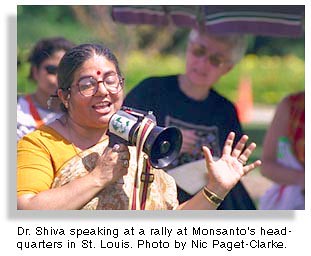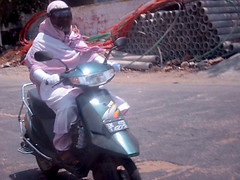This year’s Distinguished Visitor in Women’s Studies at the University of Windsor is Uzma Shakir, a Pakistan-born community activist making a difference in Scarborough, Ontario. She is the 2003 recipient of the Jane Jacobs Prize and was recently awarded the Atkinson Foundation’s Economic Justice Award in recognition of her work on behalf of immigrants in the Greater Toronto Area. She works on issues related to immigration, social equity, the racialization of poverty, and the future of multiculturalism in Canada.
The events are open to the community but some require an rsvp. Details are below.
Week of Events 2008
Women, Knowledge and Activism, Class Visit
To be truly empowered, Uzma argues, women must do more than consume knowledge; they must use their own understanding of the world as a basis for knowledge. Uzma’s experiences with the feminist movement in Pakistan under a military dictatorship taught her that solidarity among women is built through directly engaging issues of complicity and marginality.
Date: Wednesday 22 October
Time: 4:00 p.m. – 7:00 p.m.
Place: Chrysler Hall South, room 162 (University of Windsor)
Course: Women in Protest
Instructor: Prof. Nancy Gobatto
Public Announcement to the Press
Date: Thursday 23 October
Time: 10:00 a.m. – 11:00 a.m.
Place: Toldo Health Education Centre, room 203 (University of Windsor)
What Does an Inclusive Feminism Look Like?, Class Visit
Speaking as a woman of colour with a history of feminist activism in Pakistan, Uzma argues that mainstream North American feminism has not served women of colour because it has been slow to question its own complicity with the imperial agenda of the state, inside Canada and outside. Uzma believes that feminist solidarity with white/western women is possible only with those who understand the difference between appropriation and solidarity and who commit to deconstructing white privilege.
Date: Thursday 23 October
Time: 11:30 a.m. – 1:00 p.m.
Place: Toldo Health Education Centre, room 203 (University of Windsor)
Course: History of Women’s Movements in North America
Instructor: Dr. Renée Bondy
The Veiled Woman as Social Outsider, Class Visit
Uzma will show how Canadian state and public discourses have pathologized certain communities since 9/11, and how these
discourses frame Islamic women as “oppressed” in contrast to “liberated” white/western women.
Date: Thursday 23 October
Time: 2:30 p.m. – 4:00 p.m.
Place: Toldo Health Education Centre, room 203 (University of Windsor)
Course: Women, Race, and Social Justice
Instructors: Dr. Anne Forrest and Dr. Jane Ku
Islam, Women, and Canadian Law, Class Visit
Uzma will discuss the consequences for Islamic and non-Islamic women of the Ontario government’s decision to exclude Shari’a law from the arbitration process for resolving marital conflict, and of Elections Canada’s decision to permit veiled women to vote.
Date: Thursday 23 October
Time: 4:00 p.m. – 7:00 p.m.
Place: Vanier Hall, Winclare A (University of Windsor)
Course: Women and the Law
Instructor: Prof. Amanda Burgess
This event is co-sponsored by the Stephen Jarislowsky Chair, Centre for Religion and Culture at Assumption University.
New Canadian Mothers: A Delicate Balancing Act, Class Visit
Uzma will discuss the dilemma of immigrant mothers who are responsible for transmitting the “home” culture to their children while negotiating a new cultural environment on their behalf. She will examine the burdens that racialization and criminalization impose, in order to show how race and marginality complicate the mothering process.
Date: Friday 24 October
Time: 8:30 a.m. – 11:30 a.m.
Place: Toldo Health Education Centre, room 203 (University of Windsor)
Course: Mothering and Motherhood
Instructor: Prof. Jacqueline Bobyk-Krumins
What Can Women Do Together?, Community Organization Luncheon
Uzma argues that social agencies must actively connect with other community groups for social change. Otherwise, they will leave unchanged the society that produces the social problems the agencies have been created to solve. Panelists will describe the very real barriers to moving beyond the service delivery model.
Panel Discussion with: Uzma Shakir, Patricia Noonan, and Gisèle Harrison. Rachel Olivero – moderator.
Date: Friday 24 October
Time: 12:00 p.m. – 2:00 p.m.
Place: Club Alouette, 2418 Central Ave.
If you or your delegate plan to attend, please R.S.V.P. to wsvisitor@uwindsor.ca or 519-253-3000 ext. 3727.
Take Back the Night March
A Call to Action: Identifying the Pressing Issues for Women
Take Back the Night is a world-wide event protesting male violence against women and children. All are welcome to the rally; however, the march is for women and children only. The march is symbolic of women’s right to reclaim the night without the need for a male escort.
Keynote Speaker: Uzma Shakir
Date: Saturday 25 October
Time: 8:00 p.m. – 10:00 p.m.
Place: Memorial of Hope, University of Windsor (between Essex & Dillon Halls)
Rally begins at 8:00 p.m., march to follow. For more information, please visit www.uwindsor.ca/takebackthenight.
In Conversation with…Uzma Shakir
Please join Friends of Women’s Studies for an afternoon of friendship and conversation with Uzma Shakir.
Date: Sunday 26 October
Time: 2:30 p.m. – 5:00 p.m.
Place: Betty Wilkinson Room, Art Gallery of Windsor, 401 Riverside Dr. W.
Tickets: $250 (this event is free for members of 250 for $250 and major donors)
R.S.V.P. by telephone at 519-253-3000 ext. 3727 or by e-mail at wsvisitor@uwindsor.ca by October 17.
“We are here because you were there!”, Class Visit
Uzma will examine connections between local and global conditions for women, in particular, how the growing disparity in wealth worldwide makes women in Canada more and more reliant on the undervalued labour of women in the global south.
Date: Monday 27 October
Time: 10:00 a.m. – 11:30 a.m.
Place: Odette Building, room 104 (University of Windsor)
Course: Women in Canadian Society
Instructors: Prof. Nancy Gobatto and Prof. Daniella Beaulieu
Re-scripting the National Narrative: A Woman’s Perspective, Class Visit
Uzma will illustrate how certain commonplace words and phrases obfuscate gender, race, sexuality and economic inequalities. She will deconstruct terms such as liberal democracy, multiculturalism, reasonable accommodation, diversity and tolerance.
Date: Monday 27 October
Time: 2:30 p.m. – 4:00 p.m.
Place: Dillon Hall, room 361 (University of Windsor)
Course: Language and Women’s Place
Instructor: Prof. Nancy Gobatto
Beyond Sisterhood: Race, Immigration and Solidarity, Community Dinner
Keynote Speaker: Uzma Shakir
Date: Tuesday 28 October
Time: 5:30 p.m. Reception, 6:30 p.m. Dinner
Place: G. Caboto Club, 2175 Parent Ave. at Tecumseh Rd. E.
Tickets: Individual: $60
Students: $15
Table of 10: $600
Sponsor a table: $600 ($600 charitable tax receipt)
Sponsor a student: $60 ($60 charitable tax receipt)
R.S.V.P. by telephone at 519-253-3000 ext. 3727 or by e-mail at wsvisitor@uwindsor.ca or you may register online.
Please note that the office will close at 12:00 p.m. on October 28, 2008. Tickets may be purchased at the door.
For more information, e-mail wsvisitor@uwindsor.ca or call 519-253-3000 ext. 3727.
 Comments(7)
Comments(7)
